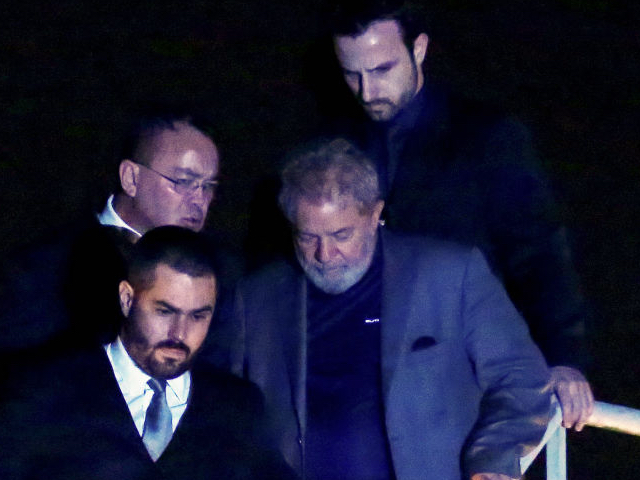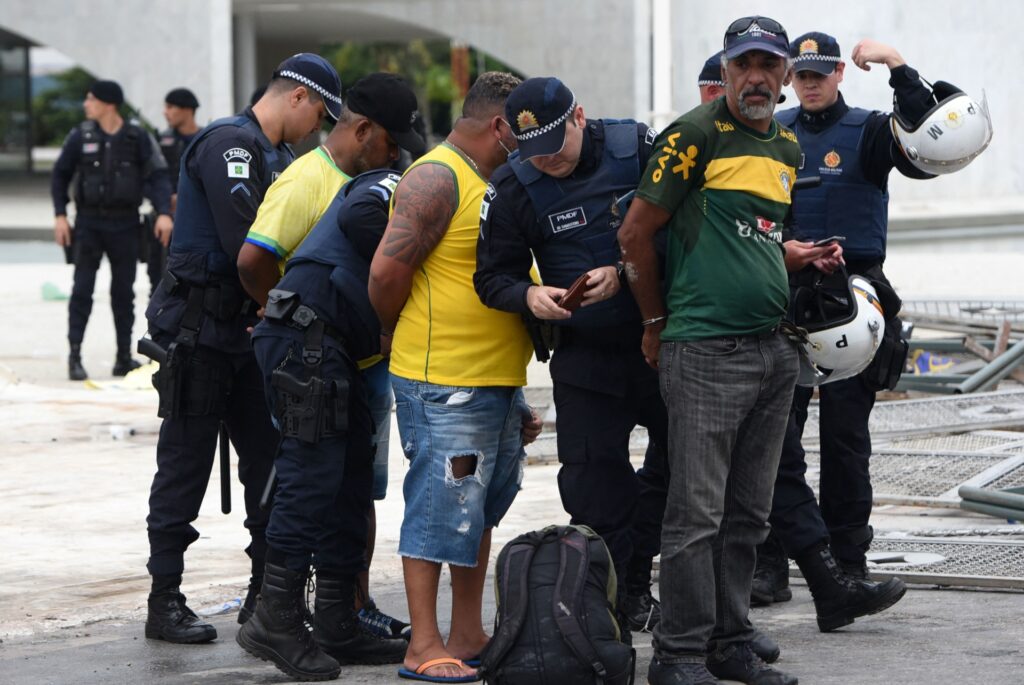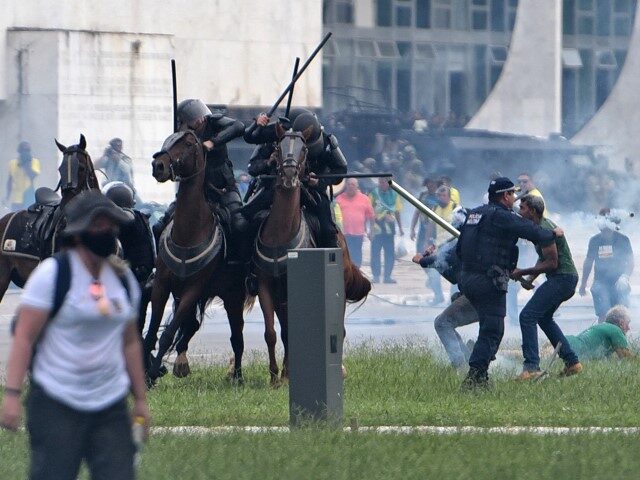The highest court in Brazil, the Supreme Federal Tribunal (STF), sentenced two of the first defendants implicated in the January 8 Brasilia riot to 17 years in prison on Thursday on a variety of charges including “attempted coup d’etat” and “attempted abolition of the democratic rule of law.”
Aécio Lúcio Costa Pereira, 51, was identified as part of a crowd of thousands of supporters of conservative former President Jair Bolsonaro who stormed the Brazilian Congress, STF headquarters, and office of the presidency in January in large part due to videos Pereira himself published on social media in which he documented the chaos in the capital.
“For those who didn’t believe it, we’re here,” he said in one of his social media videos, wearing a shirt reading “military intervention now.” “It will work. Don’t give up, get on the streets.”
The court processed Pereira alongside two other defendants: 43-year-old Já Thiago de Assis Mathar and 24-year-old Matheus Lima de Carvalho Lázaro. Like Pereira, Lima de Carvalho was sentenced to 17 years in prison. Mathar received a 14-year prison sentence, lower than the others because he did not publish videos online or use social media to encourage more people to join the riot.
The defendants were also ordered to pay a fine of 30 million reals ($6.15 million) for property damage.
The convictions and sentences were the first in what are expected to be hundreds of criminal cases tied to the events of January 8, 2023. On that day, thousands of Bolsonaro supporters from around the country convened in Brasilia to protest the election of current President Luiz Inácio Lula da Silva, who had narrowly defeated Bolsonaro for the executive post in October. Prior to the massive congregation in January, conservatives across the country had staged continuous peaceful protests against Lula’s return to power; the socialist had governed previously for two terms from 2003 to 2010.
Bolsonaro supporters objected to Lula’s election for a variety of reasons. Some claimed that evidence existed of nationwide electoral fraud helping Lula defeat Bolsonaro, citing a statement released in November by the Armed Forces of Brazil stating a “possible security risk” could have compromised the election results. Others complained that Lula should never have been on the ballot at all, as he was convicted in 2017 of corruption while in office; Lula allegedly used ill-gotten gains as president to purchase a luxury beachfront property. The STF overturned the conviction in 2021, freeing him from prison and allowing him to run for president on a technicality, never presenting any evidence that Lula was innocent.

Brazilian ex-president (2003-2011) Luiz Inacio Lula da Silva arrives at the Federal Police headquarters where he is due to serve his 12-year prison sentence, in Curitiba, Parana State, Brazil, on April 7, 2018. (HEULER ANDREY/AFP via Getty Images)
Many protesters called for a “military intervention” to remove Lula, who was inaugurated into the office on January 1, from the presidency. They insisted that they were not calling for a coup but, rather, the use of a provision in the Brazilian Constitution that can be invoked to prevent the inauguration of a president “to curb a serious compromise of public order, to maintain national integrity, to repel a foreign invasion,” or several other reasons.
The January 8 protest in the capital descended into a riot when thousands of participants began storming the headquarters of the three federal powers, causing significant property damage in the Congress and Lula’s offices. The rioters materially damaged the glass facades of two of the three buildings. In the STF, rioters destroyed the seats of the judges and stole the door of the office of STF Minister (Justice) Alexandre de Moraes, parading it around outside as a trophy.
While many of the scenes of the day were chaotic, other protesters on site were seen peacefully chatting with police officers, apparently engaging in no damaging activity.
Brazil’s attorney general office has charged 1,390 people with crimes related to the January 8 riot, concluding the legal proceedings for three of them on Thursday. Lula’s government has also banned Bolsonaro himself from running for office for the next eight years, keeping him out of the presidential race until 2030 if the ban is not overturned, on accusations that he spread “misinformation” about potential election fraud.

Security forces arrest supporters of Brazilian former President Jair Bolsonaro after retaking control of Planalto Presidential Palace in Brasilia on January 8, 2023. (TON MOLINA/AFP via Getty Images)
On Thursday, STF Alexandre de Moraes, a self-styled “fake news” crusader who has advocated for extreme restrictions on free speech, conceded in his remarks voting to convict the three that the rioters were not armed, but described the riot as “not a Sunday walk in the park” and identified calls for the military to prevent Lula’s takeover as the principle cause for alarm.
“They didn’t have heavy weapons, no rifles, but they were numerically prodigious and the idea was that, through this destruction, with the takeover of the three branches, there would be a need for a guarantee of law and order,” de Moraes said. “With that, they were asking that the armed forces, principally the Army, join this coup d’etat.”
While most STF ministers voted to convict, dissenting Minister Nunes Marques objected to charges of attempting a coup d’etat and argued for the court to reduce the sentences to property damage, which would have resulted in sentences of two to three years in prison. Another minister, André Mendonça, suggested seven years in prison and questioned the lack of security around the federal offices that allowed for an unarmed crowd to cause so much damage. Mendonça and de Moraes reportedly butted heads as the latter deemed Mendonça’s questioning of security protocol “absurd.”
Davi Tangerino, a criminal law professor at the University of the State of Rio de Janeiro (Uerj), described the sentences as “excessive” in remarks to the Brazilian outlet UOL on Friday.
“I see the result as excessively punitive,” UOL quoted the professor as saying. “I don’t look so much at the number [17 years in prison], which is quite high. We arrived at it because there is an accumulation of criminal charges that seems undue to me.”
Tangerino identified the charges of “impeding through violence the constitutional powers” and “attempting to overthrow a legitimately constituted government” as particularly egregious, as they mean the same thing – “you cannot overthrow the government without automatically preventing the exercise of constitutional power.”

COMMENTS
Please let us know if you're having issues with commenting.